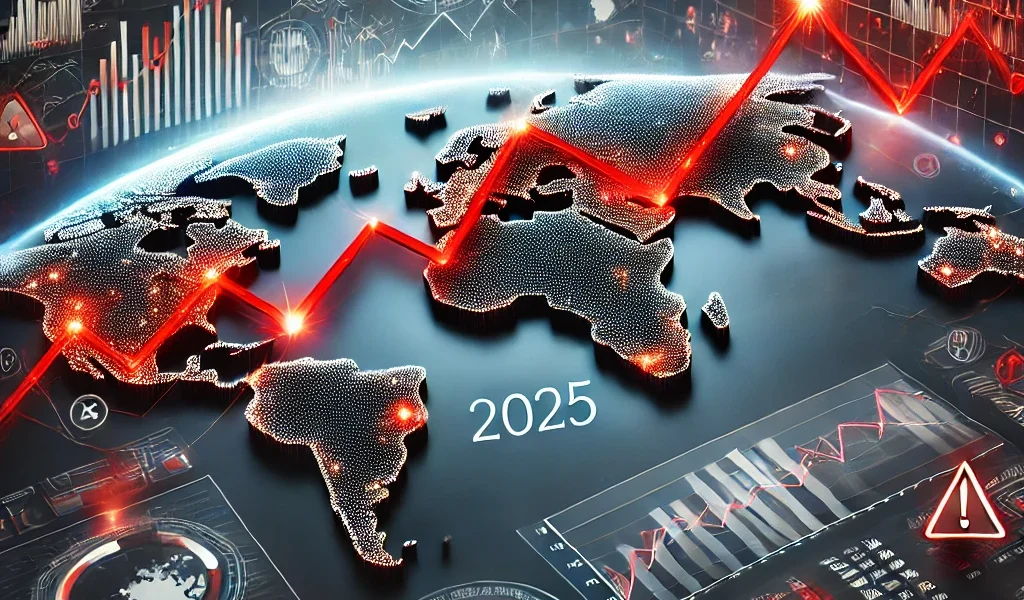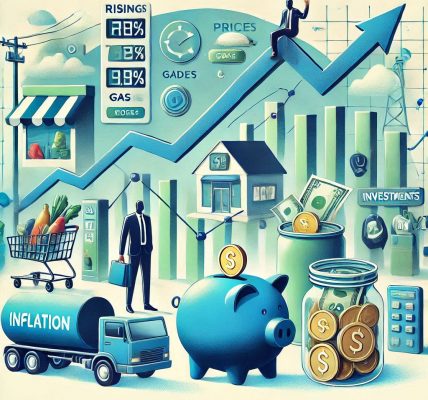Introduction
As the global economy continues to navigate uncertainties, experts are increasingly concerned about the possibility of a global recession in 2025. With multiple factors influencing financial markets, businesses, and consumers, understanding these predictions is crucial for making informed decisions. This blog explores expert insights, economic indicators, and potential strategies to mitigate the impact of a downturn.
What is a Global Recession?
A global recession is a prolonged period of economic decline that affects multiple countries. It is typically characterized by:
- Negative GDP growth across major economies
- Rising unemployment rates
- Declining industrial production
- Reduced consumer and business spending
The International Monetary Fund (IMF) and World Bank monitor global economic trends to assess whether the world is heading toward a recession.
Key Factors Contributing to a Potential 2025 Recession
1. Rising Interest Rates
Central banks worldwide, including the U.S. Federal Reserve and the European Central Bank, have raised interest rates to combat inflation. While higher rates help control price increases, they also slow down borrowing and investment, which can hinder economic growth.
2. Persistent Inflation
Despite efforts to curb inflation, the cost of living remains high in many parts of the world. Supply chain disruptions, energy price fluctuations, and geopolitical tensions have contributed to inflationary pressures, reducing consumer purchasing power.
3. Geopolitical Tensions and Trade Wars
Ongoing conflicts, such as those between Russia and Ukraine or U.S.-China trade tensions, have disrupted global trade. Supply chain bottlenecks and sanctions have led to higher costs for raw materials, affecting production and pricing worldwide.
4. Stock Market Volatility
Financial markets have experienced extreme fluctuations due to investor concerns over economic stability. A major stock market downturn could erode wealth, impact retirement funds, and reduce corporate investments.
5. Declining Consumer Confidence
Consumer confidence is a significant driver of economic growth. With fears of job losses and declining incomes, people are likely to cut back on spending, leading to reduced business revenues and potential layoffs.
6. Debt Burden on Governments and Corporations
Many governments and corporations took on substantial debt during the COVID-19 pandemic. As interest rates rise, servicing this debt becomes more expensive, limiting fiscal policies aimed at economic recovery.
What Experts Are Predicting for 2025
IMF and World Bank Outlook
The IMF has issued warnings about slowing global growth, citing high debt levels and geopolitical instability as major concerns. The World Bank has also revised its economic forecasts, predicting sluggish growth for many major economies.
Renowned Economists’ Opinions
- Paul Krugman (Nobel Laureate in Economics) believes that while a severe recession may be avoided, economic stagnation is a real risk.
- Nouriel Roubini (Famed for Predicting the 2008 Crisis) warns of a “polycrisis” where multiple economic shocks could converge, triggering a deep recession.
- Janet Yellen (U.S. Treasury Secretary) has expressed concerns about the resilience of global supply chains but remains hopeful that policy measures can avert a severe downturn.
Market Analysts’ Forecasts
Leading investment banks, such as Goldman Sachs and Morgan Stanley, have issued mixed forecasts. While some analysts predict a mild slowdown, others fear a sharp economic contraction if central banks continue aggressive monetary tightening.
Possible Scenarios for 2025
Best-Case Scenario
In an optimistic scenario, inflation stabilizes, central banks adjust their policies, and global trade recovers. Technological advancements and infrastructure investments could drive growth, preventing a full-scale recession.
Moderate Slowdown Scenario
A moderate slowdown would involve sluggish GDP growth without a full recession. Governments might introduce stimulus packages to support businesses and households, keeping the economy afloat.
Worst-Case Scenario: A Severe Global Recession
If multiple economic shocks occur simultaneously, the global economy could face a deep recession. Mass layoffs, collapsing stock markets, and declining corporate earnings could create financial turmoil similar to the 2008 crisis.
How Businesses and Individuals Can Prepare
For Businesses:
- Diversify Revenue Streams: Expanding into new markets can mitigate risks.
- Optimize Costs: Reducing unnecessary expenditures and increasing efficiency can improve financial stability.
- Build Cash Reserves: Having liquidity can help businesses navigate difficult times.
- Invest in Technology: Automation and digital transformation can enhance productivity and competitiveness.
For Individuals:
- Increase Emergency Savings: Having 6-12 months’ worth of expenses saved can provide financial security.
- Diversify Investments: Spreading investments across different assets can reduce risk.
- Enhance Skills and Education: Continuous learning can increase employability in uncertain job markets.
- Reduce Debt: Paying down high-interest debt can reduce financial burdens during economic downturns.
Conclusion
While there are legitimate concerns about a potential global recession in 2025, economic predictions are inherently uncertain. Staying informed, making strategic financial decisions, and preparing for different scenarios can help individuals and businesses navigate challenging economic conditions. By adapting to changing economic landscapes, both businesses and consumers can position themselves for long-term success despite short-term challenges.
Final Thoughts
As 2025 approaches, it is crucial to monitor key economic indicators and expert analyses. Policymakers, businesses, and individuals must take proactive measures to safeguard financial stability in an unpredictable global economy. Whether or not a recession occurs, preparedness remains the best strategy for resilience in uncertain times.




